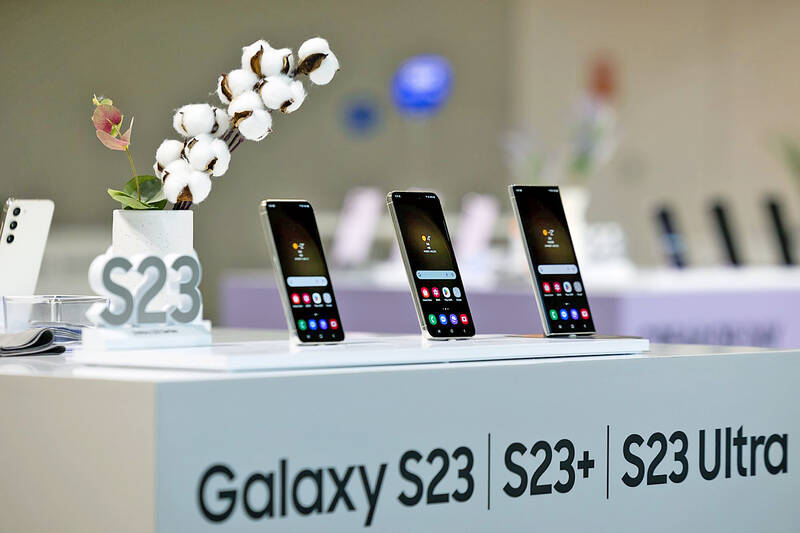The US is likely to impose a limit on the chip production capabilities of Samsung Electronics Co and SK Hynix Inc in China, a senior US official said, as Washington works with allies to curb Beijing’s access to cutting-edge technologies.
“We’re working with those companies on the way forward there,” US Undersecretary of Commerce for Industry and Security Alan Estevez said at a think tank event on Thursday.
“What it’ll likely be is a cap on the levels they can grow to in China,” he said.

Photo: Bloomberg
South Korean companies won a one-year reprieve from sweeping US export controls unveiled in October last year that prevent chipmakers from bringing in equipment for their advanced facilities in China.
Without a license extension, it is unclear how Samsung and Hynix would proceed — as they are depend on China as a key market and a manufacturing site for their memory chips.
“If you’re at whatever layer of NAND, we’ll stop it somewhere in that range,” Estevez said, referring to a type of memory chips used in electronic devices including smartphones and servers.
“It’ll depend on what the Chinese are doing too,” he added.
He did not specify the precise level of chip technology at which the US would seek a cap.
The US and South Korea started a working group on export controls in November last year, he said, without elaborating on the degree of collaboration between Washington and Seoul.

NEW IDENTITY: Known for its software, India has expanded into hardware, with its semiconductor industry growing from US$38bn in 2023 to US$45bn to US$50bn India on Saturday inaugurated its first semiconductor assembly and test facility, a milestone in the government’s push to reduce dependence on foreign chipmakers and stake a claim in a sector dominated by China. Indian Prime Minister Narendra Modi opened US firm Micron Technology Inc’s semiconductor assembly, test and packaging unit in his home state of Gujarat, hailing the “dawn of a new era” for India’s technology ambitions. “When young Indians look back in the future, they will see this decade as the turning point in our tech future,” Modi told the event, which was broadcast on his YouTube channel. The plant would convert

‘SEISMIC SHIFT’: The researcher forecast there would be about 1.1 billion mobile shipments this year, down from 1.26 billion the prior year and erasing years of gains The global smartphone market is expected to contract 12.9 percent this year due to the unprecedented memorychip shortage, marking “a crisis like no other,” researcher International Data Corp (IDC) said. The new forecast, a dramatic revision down from earlier estimates, gives the latest accounting of the ongoing memory crunch that is affecting every corner of the electronics industry. The demand for advanced memory to power artificial intelligence (AI) tasks has drained global supply until well into next year and jeopardizes the business model of many smartphone makers. IDC forecast about 1.1 billion mobile shipments this year, down from 1.26 billion the prior

People stand in a Pokemon store in Tokyo on Thursday. One of the world highest-grossing franchises is celebrated its 30th anniversary yesterday.

Zimbabwe’s ban on raw lithium exports is forcing Chinese miners to rethink their strategy, speeding up plans to process the metal locally instead of shipping it to China’s vast rechargeable battery industry. The country is Africa’s largest lithium producer and has one of the world’s largest reserves, according to the US Geological Survey (USGS). Zimbabwe already banned the export of lithium ore in 2022 and last year announced it would halt exports of lithium concentrates from January next year. However, on Wednesday it imposed the ban with immediate effect, leaving unclear what the lithium mining sector would do in the